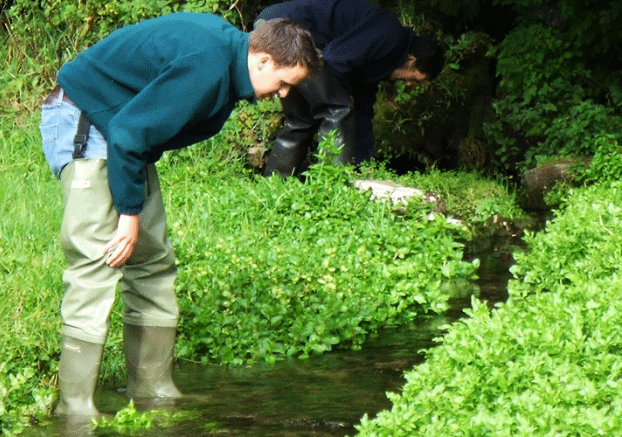Check the Becks - how you can help!
March 2024
It’s easy to be overwhelmed by all the bad news about the environment: climate change, sea level rise, flooding, droughts, the biodiversity crisis…
The list seems endless and depressing, and far too big for any of us to do anything about. But rather than say “it’s all too much, there’s nothing I can do”, wouldn’t it be better to say, “what can I do, in my own little patch, to make a difference?”.
West Wolds Slow the Flow can offer a little something you can do to make a difference in your local area… it's time to Check the Becks!

Our Becks are amazing Chalk Streams
We often talk about chalk streams at WWSTF, as we have some of the best in the UK, here in East Yorkshire.
They are fed by water from the Wolds chalk aquifer, they are very much more constant than 'ordinary' streams. They start off clear and clean, because they are filtered by the chalk. Their rate of flow, mineral content and temperature of the water is much steadier throughout the year than that of other watercourses. These properties make them rich in insect, fish and plant life, provided they are not polluted and they do not suffer too much from water abstraction or land drainage.
No wonder they are regarded as the UK's "unique contribution to global ecology".
The becks that run so constantly through our villages are vitally important habitats. See our blog on Chalk Streams to find out more about their presence in the WWSTF catchment area.
Freshwater Biological Association
The University of Hull Biology department is undertaking research, sampling invertebrates (things like shrimps, worms, flies, snails, mussels) to establish the water quality across the catchment, from Newbald to Ellerker.
We have the chance to support this work with Citizen Science carried out by local people. Our friends at East Yorkshire Rivers Trust have found a project run by Natural England and the the Freshwater Biological Association.
Discovering Priority Habitats aims to assess the natural health of smaller water-bodies. Citizen scientists are trained to conduct ‘naturalness assessments' and upload their data. This will be used by Natural England to update the priority habitat designated sites in England. Refining priority habitat locations is vital in ensuring we protect natural freshwater sites in current ‘good’ health and encourage restoration action in desirable locations.
The Freshwater Biological Association delivers training days to external organisations interested in monitoring freshwater naturalness. Citizen scientists are given a one-day training session on how conduct entry-level naturalness assessments independently. Attendance is welcome by freshwater beginners and experts alike.

How to get involved
WWSTF will be setting up a training day, which will be free to attend. If you have an interest in nature, or perhaps you like fishing and are interested in freshwater biology, come along to learn more.
Don’t be overwhelmed. Join other local people who care, and do something to make a difference. If you are interested, contact us by email, or phone 01430 423204. We will then let you know when we have the date and location for the training course.